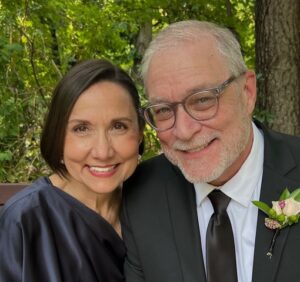
Podcast: Play in new window | Download
There is a good side to anticipation and a negative side. It creates excitement, but when we anticipate too much it could create limits. When we over anticipate sometimes we craft a future that is based upon our anticipation, which is limited by our wisdom and insight, rather than gradually moving into the better future God has prepared for us. In this episode, David and Donna talk about the importance of anticipatory leadership, but consider the pitfalls of over anticipation to a life of faith and trust.
Don’t Over Anticipate: Looking Forward with Trust and Faith
I am an anticipatory leader, at least I try to be. I try to anticipate where things are going, think through things, and when problems arise I am already there waiting for them. A leader has to look forward, has to consider different scenarios, and must think through contingencies.
We should have a long view of life. We should consider trends, cultural movement, and very practically, we need to lean on our experience to predict outcomes. I’m at the place in my life where I pretty much know how some things are going to turn out before I even start and that is a huge asset.
Anticipation can also be a hindrance, and that is our focus with this episode. How much should we anticipate? When should we move forward without anticipation? When might anticipation become a hindrance to our future—or better stated, God’s future?
(Definition) Anticipation is looking forward with expectation or hope and charting our course based upon our past experience, gained wisdom and knowledge, feelings, predictions, insights, etc.
I want to be transparent, my desire to consider the topic of anticipation was prompted by a revelation I had while listening to the heartbeat of the Father. The word I heard was, “stop anticipating.” Now, that is definitely a revelation that has to be put in context, because anticipation is more a good thing than a bad thing.
In our journey I was anticipating beyond what I knew. I was starting to anticipate beyond the revelation I had received. In other words, I was not only anticipating my leadership movements in the arena of where I knew we were going, but I began to anticipate beyond the revelation I’d been given. We have a tendency to fill in the blanks and try to anticipate outcomes beyond the scope of our trust.
Now, if you are not a spiritual person you may be a bit lost with what we are talking about. To each of us is given a measure of faith. We are certain of many things, and in those things we must have the confidence to move forward, but when we get beyond that faith level and start manufacturing outcomes in our head, at worst we will end up designing a future for which we were not intended, or at best we will create a lot of anxiety in our lives because we cannot figure out how to get from point A (where we are) to point B (the future we have concocted in our own minds).
There is a difference between leadership and spiritual leadership. Leaders draw from all of their resources to lead people to a desired outcome. Spiritual leaders do the same, but spiritual leaders draw from the revealed resources of God to lead people to God’s desired outcome. This being the case, our anticipation must within the boundaries of the revelation we’ve received.
Over Anticipation May Limit Divine Possibilities
There is a good side to anticipation and a negative side. It creates excitement, but when we anticipate too much it could create limits. When we over anticipate sometimes we craft a future that is based upon our anticipation, which is limited by our wisdom and insight, rather than gradually moving into the better future God has prepared for us.
“Now to him who is able to do far more abundantly than all that we ask or think, according to the power at work within us, to him be glory in the church and in Christ Jesus throughout all generations, forever and ever. Amen.” Ephesians [3:20]-21 ESV
If God is able to do far more than we can even imagine, then we must be ever aware of the limits of our forward looking. We do not stop looking forward, but we look forward and anticipate based upon the revelation we’ve received. We must separate the things we know from the things we think. We anchor differently in the things we have come to know through revelation than in the things we predict or think based upon instinct and past experience. A great leader knows the difference between those thing for which they have a reasonable certainty, and those things they instinctually anticipate.
When we over anticipate, and in turn we prepare and meticulously craft our paths based upon our strong anticipation, we may limit the organic unfolding of things that happen along the way that cannot be anticipated.
Here’s the thing… I have a very definite path I am walking. It is clear to me. I know I am living in the right direction. I know it. But sometimes I try to envision too far down the road. I find myself starting to anticipate specific outcomes. Vision is such a great thing, but sometimes the path we are on is leading us to far greater things than we can even imagine and if we limit ourselves to only the things we can imagine we are going to miss something.
I am an “engineer” type guy, so this is hard for me too, but we have to let life unfold. We anticipate our next steps, but one thing leads to another, which leads to another, which leads to another. I am simply saying, let’s leave some room for things to unfold that we did not think about, and then lets reorient and continue down the path.
Over Anticipation May Bring Negative Things to Pass
Negative anticipation is a leadership and life pit. I’ve hung out with a lot of successful entrepreneurs over the course of my life. I’ve had friends who were incredibly wealthy, built strong businesses that were so enduring they passed them on to their children. I’m privileged to have had friends who had a vision from God to establish a church and the lead the building of a strong and vibrant transformational center in the heart of their community. I have not known one single case where the overriding outlook of the leader who accomplished such things was negative.
Each of them were motivated by an anticipation of the fulfillment of something they could see in the realm of the unseen.
When we anticipate failure, we will probably fail. We discussed the power of positive self-talk in episode 42.
Why do I talk so much about this… its because I will talk myself right into failure if I let myself do it. God has better things for me than the “what if” future I tend to create for myself.
Over Anticipation Keeps Us From Starting
If we cannot envision the final outcomes of our paths, it causes a hesitancy to even begin.
Over Anticipation May Kill Our Vision
Vision is not anticipation, it is a direction. It is not a specific picture of the future and what it will be, it is our interpretation of the revelation of God into temporal images. I must not anticipate the specifics of the end.
I’ve been told we should be specific in prayer, and I think this is correct encouragement within the parameters of what we are certain of. Hebrews 11, Faith is the substance of things hoped for and the evidence of things not yet seen. We can only be specific in praying to the degree that we have clarity of the outcomes of the future. When we become specific in our praying in anticipation of the outcomes of our path, we may be praying amiss because we do not yet have the full certainty of where our paths are taking us.
So, I cannot be specific in my praying beyond the parameters of what has been revealed to me.
I know the direction we are to walk, I just do not know where the path ends. When we go on a hike in a new place we start with a destination in mind, but we are prepared for things along the way that divert out path… it’s okay.
We incorporate our assumptions into the vision of God and we assume those assumptions are a part of God’s vision, then we are disappointed in God when our assumptions do not come to pass, but the better path has been established.
The framework we need that we don’t have yet, and the building of that framework, and the reality that pieces of that framework are only going to come together from revelations we will gain ON the journey. If we have to anticipate the entire journey, we will not start, if we do not start we will not gain the framework we will receive along the way.
Calibration Tools… Calibrating Our Lives and Lifting Those we Love and Lead
- Identify the things you know from the things you assume. It is okay to assume things about the future, but keep clear on what you are confident has been revealed to you (and leave some margin for correction) and the things you are still searching out.
- Move forward with trust in the things for which you have a confident assurance, and let unfold the things you do not yet know.
- Are you overly negative in your assumptions and anticipation? Should you be? As a leader, are you too negative from the front of the room? Do you paint a gloomy picture of the future? How can you positively frame the path you are on?
- When you are hesitant to start a journey because of fear and negative anticipation, isolate the things you know and craft a sure path, even if it is a short one, in the faith that it will continue to unfold as you walk.
- Have you ever attributed a vision to God and then been angry when it did not come to pass? ours is to trust God’s directions, to follow them sincerely, and not over anticipate the outcomes.
Finally…
Have you ever worked a large jigsaw puzzle without the picture on the box? You stare at the pieces scattered on the table top trying to envision how they go together. The only thing you can do is look for one or two pieces that go together and then repeat that process over and over again.
if you don’t have the box top with the picture on it you have to anticipate what the final picture will look like by looking at all of these scattered pieces. As it comes together your vision of the end result changes until you are almost finished and then you can clearly see where this is going.
The task at hand is always the next few pieces that fit together. The big picture is building, and we take on the challenge in anticipation of the satisfaction we will receive when we finish. If the picture looks a lot different than the one we had in our mind when we started, that’s okay, because we forged forward believing that it would be better than we could imagine… and when we walk with God, I am of the firm conviction that in the end, the picture is always better than we were capable of imagining.


